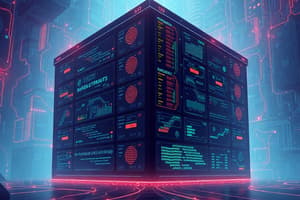Podcast
Questions and Answers
What are sets of symbols (textual, visual, audio) that may have some generic meaning or no meaning called?
What are sets of symbols (textual, visual, audio) that may have some generic meaning or no meaning called?
Data
What refers to data that has been processed to have specific meaning, often by putting it in context?
What refers to data that has been processed to have specific meaning, often by putting it in context?
Information
What refers to interconnected information signifying what is/will be, why it is/will be, and how to do something?
What refers to interconnected information signifying what is/will be, why it is/will be, and how to do something?
Knowledge
Data provides the building blocks for knowledge, and knowledge provides the building blocks for information.
Data provides the building blocks for knowledge, and knowledge provides the building blocks for information.
The boundaries between information and knowledge are always clear and distinct.
The boundaries between information and knowledge are always clear and distinct.
In Management Information Systems (MIS), what are Data, Information, and Knowledge often collectively called?
In Management Information Systems (MIS), what are Data, Information, and Knowledge often collectively called?
What is data about data called?
What is data about data called?
What does DBMS stand for?
What does DBMS stand for?
Which of the following is NOT typically considered a newer database development that might blur the line between information and knowledge?
Which of the following is NOT typically considered a newer database development that might blur the line between information and knowledge?
List three stages of the Information Life Cycle.
List three stages of the Information Life Cycle.
Which type of technology is primarily used to organize, store, and retrieve information?
Which type of technology is primarily used to organize, store, and retrieve information?
Which type of technology focuses on reducing information size while increasing relevance?
Which type of technology focuses on reducing information size while increasing relevance?
What type of software facilitates collaboration by helping users create, store, and share information?
What type of software facilitates collaboration by helping users create, store, and share information?
According to the diagram, how do Data, Information, and Knowledge generally relate in terms of size, complexity, and management cost?
According to the diagram, how do Data, Information, and Knowledge generally relate in terms of size, complexity, and management cost?
Flashcards
What is Data?
What is Data?
Sets of symbols (textual, visual, audio) that may or may not have a generic meaning.
What is Information?
What is Information?
Data with a specific meaning derived by putting data in context.
What is Knowledge?
What is Knowledge?
Interconnected information that explains what is/will be, why, and how.
Data, Information, Knowledge relationship?
Data, Information, Knowledge relationship?
Signup and view all the flashcards
What are Information Resources?
What are Information Resources?
Signup and view all the flashcards
Structured information vs unstructured information?
Structured information vs unstructured information?
Signup and view all the flashcards
What is Metadata?
What is Metadata?
Signup and view all the flashcards
What are DBMS?
What are DBMS?
Signup and view all the flashcards
DBMS Models?
DBMS Models?
Signup and view all the flashcards
What is Data Mining?
What is Data Mining?
Signup and view all the flashcards
What is OLAP?
What is OLAP?
Signup and view all the flashcards
What is Data Warehousing?
What is Data Warehousing?
Signup and view all the flashcards
What is the Information Life Cycle?
What is the Information Life Cycle?
Signup and view all the flashcards
What are Databases?
What are Databases?
Signup and view all the flashcards
What are Management Information Systems?
What are Management Information Systems?
Signup and view all the flashcards
What are Decision Support Systems?
What are Decision Support Systems?
Signup and view all the flashcards
What is Information Filtering?
What is Information Filtering?
Signup and view all the flashcards
What is Communication?
What is Communication?
Signup and view all the flashcards
What is Groupware?
What is Groupware?
Signup and view all the flashcards
Study Notes
- Management of data, information, and knowledge is explored
- The presentation was prepared by Omar Abahmane in October 2023
Data, Information, and Knowledge Relationships
- Data, information, and knowledge are related, with increasing size, complexity, and management cost from data to information to knowledge
Data
- Data refers to sets of symbols (textual, visual, audio) which may or may not have generic meaning
- Examples of data include "Salim", "server", "client", and "7Z&fXK"
- Sample data: 77° F, 4:00 PM, Agadir, 1998, Shade, Beach
Information
- Information refers to data with specific meaning, typically by putting data in some context, like a sentence
- Examples include, "Salim is my friend," "7Z&fXK is encrypted 'Salim'," and "client device sends requests to the server"
- Example usage "It was 77 °F in the shade in Agadir at 4:00 PM" and "I lived in Agadir since 77 and was member of the PMBeach Club"
Knowledge
- Knowledge refers to interconnected information that signifies what is or will be, why is or will be, and how to do it
- WHAT refers to semantics, taxonomy, episodic content, and ontology
- HOW refers to procedural knowledge related to how to do things
Relationships Between Data, Information and Knowledge
- Data provides building blocks for information and information builds knowledge
- Knowledge facilitates the creation of information from data
- New data changes information, and new information changes knowledge
- Fuzzy boundaries exist between information and knowledge
Evolution of Data, Information, and Knowledge in MIS
- In Management Information Systems (MIS), data, information, and knowledge are typically called information resources
- The term "information" is sometimes used in a broader sense in MIS
- Term "information" is inclusive of data, information, and knowledge
Information Resources: Modern Issues
- Modern issues for information resources includes more versus less structured information, like records versus documents
- Hypertext-based structures are a pattern of linked data and info
- Metadata is data about data or information/knowledge, like a data dictionary, data definitions in DBMS, and tags in markup languages
Technology for Managing Data/Information
- Database Management Systems (DBMS) include hierarchical, network, relational, and object models
- Challenges exist for managing multimedia data
Newer Database Developments
- Newer database developments include data warehousing, data mining, and Online Analytical Processing (OLAP) -There is a borderline, or "grayish area," between information and knowledge
Information Life Cycle
- The information lifecycle includes collecting/creating, storing, filtering, organizing, retrieving, transferring/sharing, using, updating, and discarding after x cycles
- Knowledge management uses a similar cycle
Technology for Information Management
- Technologies for information management include databases (organize, store, retrieve), Management Information Systems and decision support systems which have knowledge implications
- Further technologies includes information filtering to reduce size and increase relevance, communication for transfer and creation, and groupware to create, store, and share information
Studying That Suits You
Use AI to generate personalized quizzes and flashcards to suit your learning preferences.




